6/21/04 - day 13 |
| Rudyerd the runway, and camping with bears |
|
There's something very homey and comforting about these clothes I only wear away from home. The feeling grows on me with all my gear and its associated daily rituals. The dry bag into which I stuff the sleeping bag, a pair of socks, and the extra camera batteries; the food going into the Ursacks and the dry bags, and into the perfect spot in the hatch; the stove and the fuel and the carefully folded map in my deck bag. I feel it with everything, but most strongly with my clothes. My fleece suit and rain gear may stink of 13 unwashed days in the wilderness, but so do I. And they are my home here, where my location is continually changing.
|
|
And camping locations have gotten difficult of late. Rudyerd Bay is a long, beautiful and scenic cliff-lined fjord, which happens to be home to a sizeable bear population. And bears don't like cliffs. They can climb reasonably well, and can swim back and forth across the channel, but they don't live on cliffs. Unfortunately, kayakers don't like cliffs either.
Today we had planned to camp at the northern tip of Rudyerd Bay, where the map showed a flatter and shallower area near the river mouth. It seemed the most likely spot to have a campable beach. The tip of the bay was a lovely spot in the evening sun, with snowy peaks surrounding it, huge cliffs, waterfalls, a snowbridge, a yacht in the middle of the bay, and a bear swimming across a channel on the river flats.
| 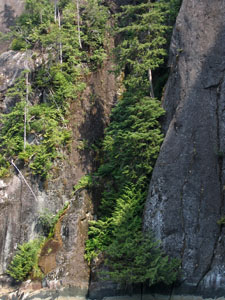 |
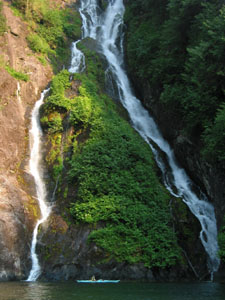 |
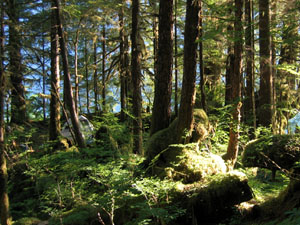 |
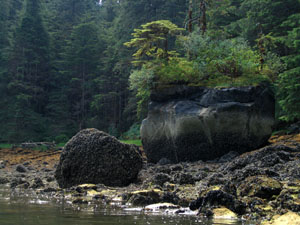 |
And there lay our problem. Needless to say, after last night we were a bit spooked about camping with bears. I woke up to the memory of the crashing, the sight of my bear-shifted kayak, and a slight lingering whiff of bear that was quite possibly imaginary. We didn't want a repeat of last night's visitation. |
|
For all my bear-country camping, that was the first time I've been visited at night, and I don't intend to make a habit of it. But we hopped out of the boats at the edge of the river flats, and hopefully poked around. We found a well-used bear trail all along the beach, piles of bear scat, and a flattened down spot that looked suspiciously like a bear bed. There lay our problem, indeed.
Of course we didn't camp there. We got back in and paddled the way we came, envious of the yacht-goers for their ability too camp in the middle of the bay. We were thankful for the summer solstice and the many hours of light remaining. At the next beach, it was the same story. The river was smaller, but the trails were beaten all along the beach, complete with bear scat, a flattened resting spot, and huge bear footprints in a muddy hole. The bears are funneled here. Everywhere they can go, they do go. My hiking instincts told me not to camp there, stupid. The rest of me wondered what normal boat campers in Rudyerd Bay must do? Live with nighttime bear visitations? But Niki wasn't comfortable their either.
We seriously considered paddling 8 miles back to a floating deck we'd seen earlier in the day and camping there. But just across the bay from our second bear beach we found a bit of beach on a point. There are rocks to either side, a steep cliffy band of alder above us, and jumping fish below. I don't think a bear would have much reason to come here, though I still harbor vague suspicions about some of the flattened grass on our knob. Hopefully we're right.
|
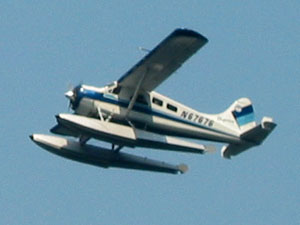 |
Rudyerd Bay is purportedly the most popular place in Misty Fjords. What that seems to mean is that on a sunny morning, the place is just a giant glorified runway. Float planes take off, float planes land, float planes zoom about overhead. We couldn't keep track of them all, but between 11:30 and 12:30 I counted 12 separate float planes leaving the bay. And then they were gone. We saw them as we set off at about 9 this morning, but by lunch time they had all cleared away.
|
|
There is also boat traffic here. We saw one giant tourist boat zoom past us on its way into and out of the bay. There was a boat in our cove last night, and a different one at the tip of Rudyerd tonight. What we have not seen is a single other crazy soul in a kayak. But I know that people come. The animals here seem more used to humans. Seals stayed on their rocks as we passed, a muskrat scrambled along the bank next to us, peering at me inquisitively and letting me keep taking his picture, and the bear at last night's campsite didn't seem at all inclined to run away when we yelled at it.
|
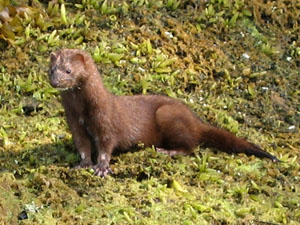 |
|
Today is summer solstice and my first wedding anniversary. Hig is not here, but I ate a Snickers bar in his honor, and am surely having good adventures for him as well.
|
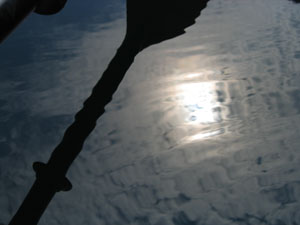 |
|
6/22/04 - day 14 |
| The ocean returns |
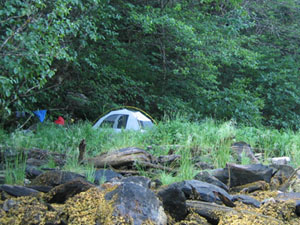 |
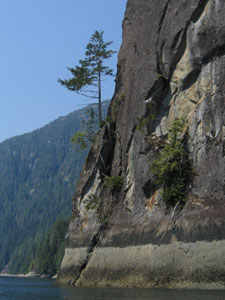 |
We were right or we were lucky. No bears visited last night, and we had only the sounds of seals to sleep to. And we had planes to wake up to. I heard the first one as I was struggling out of sleep at 7:30, and they were zooming about all morning. I got to the point where I'd glance up at birds out of the corner of my eye and half expect them to be float planes too.
As the heat continues, the haze settles more and more thickly on the land, until even a slope a mile or two away is blue with distance. Industrial pollution seems unlikely in this air, and I wonder if the haze is all from the evaporating ocean? Or maybe some distant fire, blown here and settled in our still air.
|
|
The ocean returned today. It had been glassy calm for days, like an overly large pond. When we crossed the channel two days ago the wakes of our kayaks were the largest waves on the sea. Even in Rudyerd Bay we had a little wind today. There was a small chop in the middle of the bay, waves to rock the boats and slap them into the rocks as they sat on the beach, and some wind to fight with our paddles. But when we rounded Point Louise into Behm Canal proper, there we had ocean.
It started with a headwind, gusting and railing at us, and making every push of the paddle (even a feathered paddle) an all out effort. We were only inching along, and quickly abandoned our plans o visit New Eddystone Rock in the middle of the channel.
Just then, as we were struggling and concentrating to make any headway at all, we ran into the first people we've talked to since the kayaker at Blind Pass on our fourth day out. Four kayak rangers were headed the opposite direction, being pushed by the wind up the coast. One was quite friendly, and we chatted with him a few minutes as he hung back and we tried not to be swept too far the wrong direction. I wish we'd had longer. But we did pick up one interesting piece of information, which is that Sunday, the day we hiked to Manzanita Lake, was the hottest day ever on record in Ketchikan. 88 degrees. I feel justified for feeling baked. We have certainly come for an unusual spell of weather.
|
|
After we left the rangers the wind slacked off a bit but the waves grew larger. They came up the channel and bounced off the rock wall of the shore, and they came at us from every direction at once. The tallest were maybe four feet high. They slapped under the boats and splashed on top of them, and rolled under us in swells, moving the boat up, down and sideways in the helter skelter mess of waves. It was fun, and much preferable to the slog against the wind. Each time I take the kayak into choppier seas I am amazed at its natural stability. It seems that all it wants to do is to sit happily upright in the water, and it asks of me only to avoid doing anything stupid.
|
 |
|
6/23/04 - day 15 |
| The afternoon ocean |
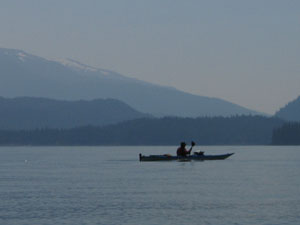 |
As a kayaker, perhaps it would be best to wake up early. When we woke up the channel was glassy cam, the sky was a clear pale blue, and all the hills and islands were cloaked in a thick blue haze. The haze is growing with each day of sun, but the heat has thankfully lessened.
|
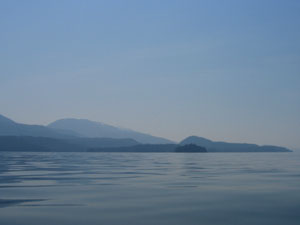 |
|
We paddled out to New Eddystone Rock, and odd-looking volcanic protuberance in the center of the channel. The seaplanes zoomed by on their way to Rudyerd Bay, and large cruise boats of tourists speed through the channel. New Eddystone Rock had a sizeable beach, where we were surprised to see and a small group of kayakers on the beach, which we were even more surprised to see. As we paddled around the rock, one of them came down to give us a survey. They were more rangers, doing surveys of intrusion and traffic in the area, and waylaying passing kayakers.
|
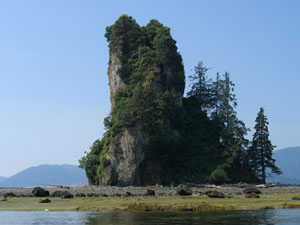 |
|
Most of the traffic they're watching is seaplanes and boats of course, particularly since 7 of the 9 kayakers I've seen on this trip are working for the forest service. But they did catch us, and they also caught the Asian kayaker, who we saw once again this morning. Apparently he's on a 6-month trip. That seem s a long way to go alone.
We left the rangers and crossed back to the shore. The dead calm turned into a pleasant breeze. The day grew hotter. We passed a forest service cabin. We stopped for lunch. And then the wind came.
It came up suddenly, rushing northward through our pass, rippling he water into small choppy waves. We could still move forward. But it was a slog. Each stroke fought the wind more than it pushed the water, and the boats inched slowly along the shore. Gusts blew through even more strongly, roughening the surface of the little waves and wrenching the paddle blades backwards. We kept paddling. Around a point. Across a little channel. Pushing. Around another little point...
And then we gave it up. With so much time, why paddle in the worst of the day? We parked in the lee of a little peninsula, hoping the wind would die down in the early evening. It hasn't. So now we hope for a morning calm and plan to sleep and rise early. Such a plan is always more easily made at 5PM than executed at 5AM, but we will try. The wind will either die down or it won't. Either way we'll be moving, but I'm hoping for the faster alternative.
|
|